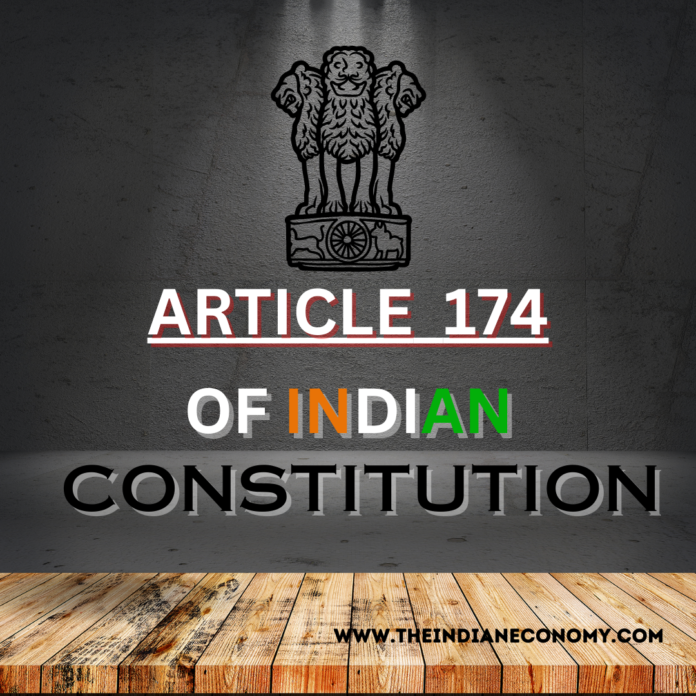Article 174 of the Indian Constitution outlines the framework for the sessions of the State Legislature, along with the concepts of prorogation and dissolution. This constitutional provision serves as the cornerstone of the legislative calendar, guiding the rhythm of activities within the state-level law-making bodies.
What does Article 174 states ?
Sessions of the State Legislature, prorogation and dissolution
(1) The Governor shall from time to time summon the House or each House of the Legislature of the State to meet at such time and place as he thinks fit, but six months shall not intervene between its last sitting in one session and the date appointed for its first sitting in the next session
(2) The Governor may from time to time
(a) Prorogue the House or either House;
(b) dissolve the Legislative Assembly
Clauses of Article 174
Clause(1) :-
- According to the initial provision of Article 174 in the Indian Constitution, the Governor is vested with the power to provide formal directives to the State Legislature’s Houses about the scheduling of their sessions.
- If the Governor deems it appropriate for the House to convene, they possess the authority to call the House to assemble at the designated time.
- According to the initial article, it is stipulated that the duration between two convened sessions, as summoned by the governor for the state legislature’s chambers, must not surpass a period of six months. This implies that the governor is required to convene a subsequent meeting subsequent to the initial meeting held within a six-month timeframe, but is not obligated to do so thereafter.
Clause(2) :-
- According to the second clause of Article 174 of the Indian Constitution, the governor possesses the power to prorogue either the House or the House of the State Legislature periodically.
- Additionally, it is stated that the Governor possesses the power to periodically dissolve the Legislative Assembly.
Key aspects of Article 174
- Sessions of the State Legislature: Article 174 emphasizes that the State Legislature (comprising the Legislative Assembly and the Legislative Council, if applicable) must hold sessions. It provides the foundation for the regular functioning of the legislature as a platform for law-making, debates, discussions, and deliberations.
- Convening of Sessions: The Governor of the state is responsible for summoning and proroguing (ending) sessions of the State Legislature. The Governor has the authority to call for sessions at intervals that ensure the efficient functioning of the legislature and the completion of legislative business.
- Maximum Gap Between Sessions: Article 174 states that there should not be a gap of more than six months between two sessions of the State Legislature. This ensures that the legislative body remains active and engaged, contributing to continuous governance and representation.
- Prorogation: Prorogation refers to the formal ending of a session of the legislative body. It is carried out by the Governor, and it marks the completion of the business and proceedings of that particular session. After prorogation, the legislative body is adjourned until the next session is summoned.
- Dissolution: Article 174 doesn’t explicitly deal with dissolution, which is the formal end of the term of the Legislative Assembly, leading to the conduct of fresh elections. However, dissolution is closely related to the session cycle. Typically, the term of the Legislative Assembly ends with its dissolution, and new elections are conducted to form a new assembly.
- Governor’s Role: The Governor’s role in convening, proroguing, and dissolving the sessions of the State Legislature highlights the ceremonial and constitutional responsibilities of this office in the legislative process. The Governor’s actions are carried out in accordance with the advice of the Council of Ministers.
- Ensuring Legislative Business: Article 174 ensures that the legislative business is conducted regularly and consistently. By mandating sessions and limiting the gap between them, it prevents undue delays in addressing issues, enacting laws, and conducting debates.
